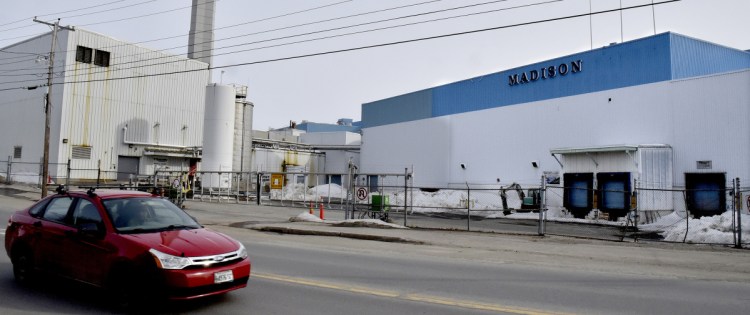The Kennebec Valley Council of Governments has received two federal grants totaling more than $130,000 for economic development in Somerset County and for future options at the shuttered Madison Paper Industries mill site.
The grant money, offered through the U.S. Economic Development Administration, consists of $70,000 for economic development and $61,000 for the “investigation and analysis of potential design alternatives and ownership options for conversion” of the mill, KVCOG executive director Rosie Vanadestine said in a news release Tuesday.
“We are grateful to our partners at the Economic Development Administration and our Congressional delegation for supporting economic development throughout our service region,” Vanadestine said. “We are particularly excited about exploring redevelopment possibilities of the former Madison Paper mill as this is one of Maine’s Forest Economy Growth Initiative’s priority areas.”
Madison Paper Industries, which closed in May 2016, putting about 215 people out of work, was sold to a buyer with plans to put the property back into use as an industrial site.
The former mill owners, UPM-Kymmene Inc. and Northern SC Paper Corp., a subsidiary of The New York Times Co., sold the mill property in December 2016 to a joint venture of New Mill Capital Holdings, of New York; Perry Videx, of Hainesport, New Jersey; and Infinity Asset Solutions, of Toronto. The partnership is called Somerset Acquisition.
Gregory Schain, a principal at New Mill Capital Holdings, could not be reached for comment on the grants Tuesday.
The hydro assets of the property were sold in April 2017 to Eagle Creek Renewable Energy, LLC, a hydroelectric power producer based in Morristown, New Jersey, marking the final step in the sale of the paper mill and opening the door for future plans at the site.
U.S. Sens. Susan Collins and Angus King said in a joint statement that the Department of Commerce’s Economic Development Administration has awarded $210,000 to Androscoggin, Somerset, and Aroostook Counties to foster economic development, support small businesses, and create jobs.
Somerset County will receive $70,000 through the EDA’s District Planning program and $61,000 through the Design Analysis program for options at the former Madison Paper mill.
“Federal investments can play a pivotal role in the development of strategies to create employment opportunities, strengthen economies, and assist communities across Maine, particularly in rural areas,” Collins and King said in the joint statement. “We commend the EDA for providing this important funding, which will bolster these Maine counties’ efforts to support small businesses and foster job creation.”
EDA is an agency within the U.S. Department of Commerce that partners with distressed communities throughout the United States to foster job creation, collaboration and innovation.
Madison Town Manager Tim Curtis said the $71,000 offered by the EDA is for economic development for a possible wide range of potential projects in Somerset County. The other grant, for $61,000, will target the Anson/Madison Sanitary District facility inside the closed paper mill site for future projects.
Curtis said it is important to separate the funding into two packages.
“The $70,000 is for EDA economic development planning districts, so that should benefit all of Somerset County, and it’s not a direct inflow of cash to the town of Madison,” Curtis said Tuesday. “The $61,000 is a separate grant that KVCOG helped the Anson/Madison Sanitary District write.”
Curtis said the sanitary district is planning to do a feasibility study to see if any waste-to-energy projects could be developed at the site that would benefit the sanitary district and draw businesses that might want to move there. The district’s waste water treatment plant is located “right in the middle” of the former mill site, he said.
One of the possibilities they are looking at is anaerobic digestion, a series of biological processes in which microorganisms break down biodegradable material in the absence of oxygen. One of the end products is biogas, which is burned to generate electricity and heat, or can be processed into renewable natural gas and transportation fuels.
Curtis said the Flood farm in Clinton uses a digester to treat its natural farm waste and turn it into energy. He said the sanitary district would be looking into food and other organic waste for processing. The district already treats about 3,000 tons of tomato plant waste every year from Backyard Farms, in Madison.
“That’s the perfect ingredient for an anaerobic digester,” Curtis said.
He said the funding is for a feasibility study, so it’s “pretty early in the process but is certainly good news for development in that area.”
Cary Tyson, the community and economic development specialist at KVCOG, said by phone Tuesday that the twin federal grants bring some hope to areas desperately in need of new economic life.
“I’m excited about the opportunity, particularly for the Madison mill,” Tyson said. “The mills are one of the targets here in the forest economy, and the study is going to give us some insight into the future revitalization possibilities there, which are particularly important for this part of the state.”
Tyson said KVCOG just received the funding a couple of days ago. A contract award will be issued to the entity that will administer the grants, soon, he said. He would not name the entity that will do the work because it has not been made official yet.
“I think we’re seeing good signs and strong engagement throughout the community,” he said. “We’re taking an asset-based economic development approach. We’re working with what we already have existing, trying to build that up and expand that.”
The news of the grants comes on the heels of an announcement in mid-February that Verso Corp. plans to upgrade the closed pulp line and No. 3 paper machine at its Androscoggin Mill in Jay, in neighboring Franklin County, bringing back an estimated 120 jobs and enabling the company to restart its equipment for the manufacture of packaging products.
The paper machine and associated pulping capacity were idled temporarily in January 2017 and shut down in July of that year as a result of declining demand for the graphic paper products formerly produced on the machine.
The company also might enjoy a windfall agreement with Canadian paper producers that could net the company $42 million. According to a March 20 filing with the Securities and Exchange Commission, Verso has struck a deal with Port Hawkesbury Paper Limited Partnership and Irving Paper Limited, both producers of glossy supercalendered paper, that could result in the return of import taxes paid by the companies.
The Verso mill no longer makes that type of paper. Verso filed a request with the U.S. Department of Commerce to indicate its circumstances have changed to “no interest” when it comes to the glossy paper.
If Verso’s requests are granted, Port Hawkesbury and Irving agree to pay Verso a percentage of the duties refunded to them, capped at $42 million.
KVCOG’s region includes Kennebec, Somerset and western Waldo counties with a population over 180,000. KVCOG is one of seven federally designated Economic Development Districts in Maine and a state designated Regional Planning and Development District.
Doug Harlow — 612-2367
Twitter:@Doug_Harlow
Send questions/comments to the editors.






Success. Please wait for the page to reload. If the page does not reload within 5 seconds, please refresh the page.
Enter your email and password to access comments.
Hi, to comment on stories you must . This profile is in addition to your subscription and website login.
Already have a commenting profile? .
Invalid username/password.
Please check your email to confirm and complete your registration.
Only subscribers are eligible to post comments. Please subscribe or login first for digital access. Here’s why.
Use the form below to reset your password. When you've submitted your account email, we will send an email with a reset code.